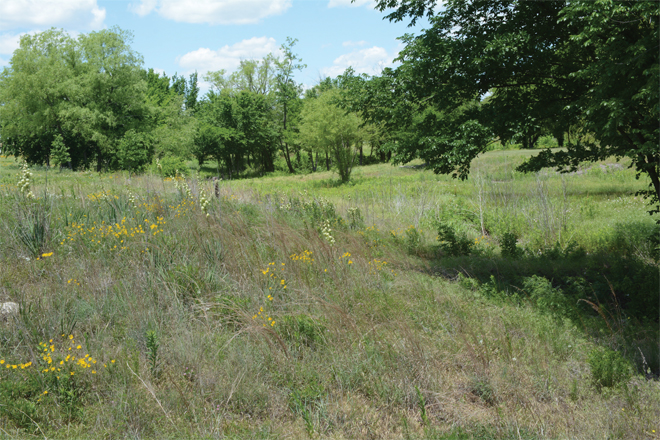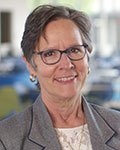My interest in plants, botanicals and the outdoors was born about 30 years ago, when I started growing native plants as a hobby. That interest has expanded ever since. Professionally speaking, I was CFO for six years at the Botanical Research Institute of Texas before coming to All Saints’ Episcopal School. That experience greatly informs my work in the school’s approach to land stewardship and especially as I work to build sustainable practices into our campus maintenance.
“Where the West Begins” has been Fort Worth’s tagline for more than 100 years, and the ecology of the area makes that clear. All Saints’ is blessed to have a sprawling 147-acre campus with a unique biodiversity and geography. Thirty-five of those acres are undeveloped, semi-native land and other meadowed areas that were once cow pastures. There are also several riparian areas — spaces that exist between land and a river or stream — which provide incredible diversity of hydrophilic plants, terrestrial wildlife and numerous birds.

.png?sfvrsn=3bb3b5c7_3)
For a nature lover, these areas are ideal for exploration. Like many business officers, I try to make it a habit to step away from my desk every so often to walk along our school’s grounds when I need to clear my mind. Often I find myself wandering amongst the most undisturbed areas of campus because I can be in that childlike place of learning and discovery. In these moments, I may be pleasantly surprised by a rare flower or plant that I don't know. In collaboration with our environmental science teacher and botany friends, we've been cataloguing native plants on our campus for several years, and we now have a good baseline of plants that were here before the school and newer arrivals.
That documentation became particularly important about three years ago, when the city needed to upsize the storm water and sanitary sewer that intercepts our campus in preparation for a neighboring housing development project. To construct those enhancements, the developer had to dig up a fairly large tract of our undeveloped area, which we were intentionally keeping in its native state. I worked with the developers and said, “Yes, we’ll grant the easement if you help us with the restoration project once construction is complete.” We negotiated an impact fee with the developers, and more importantly, they helped us rescue many of the native plants, store them for a year and re-plant them when the project was complete. They even paid for equipment operators to re-seed the area a few months later.
Nearly three years later, the replanted land is still a work in progress. We’ve seen quite a bit of native vegetation do fine under the new conditions. Perhaps the best outcome is that our leadership team has learned what it takes to view facilities management through an environmental lens. Our team and the developers both understood the importance of proper stewardship, and we can bring those lessons with us as we constantly seek improvement to our school’s master plan.
Natural Managers
In our school’s master plan, we divide campus maintenance into three different areas of influence. There is aesthetics – how our campus looks – which is highly visible to students and the community; function — for example, our athletic fields must serve the purpose of safety and playability; and lastly ecological services, i.e., how we maintain native land and places on campus, and the role they serve in nature. In my role as CFO, I help ensure that we have a clearly defined master plan that incorporates all three legs of the stool.
.png?sfvrsn=ad01fa24_3)
.png?sfvrsn=744e1c38_3)
It’s important to remember that sometimes these areas of influence will be in conflict with each other. For example, a retention pond has a very specific purpose and may not always be aesthetically pleasing. If you can define and properly communicate the purpose of a service, there's greater understanding about how spaces look, the trade offs and what they cost to maintain. As an Episcopal school, we’re practiced at discussing with kids and parents the importance of “both/and”, in other words it doesn’t always have to be one thing versus the other.
The three-legged stool analogy might best be understood through our school’s relationship with our resident beavers, who have built a dam in one of our retention ponds. In the past, fears of property damage through dam building, destabilizing banks and levees through burrowing led to multiple eviction attempts.
But we have found today that the beavers have improved water retention and quality, and we now recognize them as ecological experts. They also eat invasive species around the pond area, like cattails, which saves us the trouble of having to prune them, and the beavers tend to leave enough native plants to regrow the following season. The beavers truly have a better understanding of soil and water management than us humans!
Our next task is to convince county officials that the beavers are doing what needs to be done — that they help us maintain both the function and ecological services of our campus — and that evicting them would be to the detriment of all.
My advice to business officers looking to get into land stewardship is to be intentional. Most business officers start off thinking, “Well, if we do things in an environmentally friendly way, it will probably cost us more.” That may be the
case in terms of up-front costs, but total costs may tell a different story. Cost is not necessarily understood in just the dollars and cents but rather the total cost of land ownership. Sustainability is still an evolving topic for the financial
profession at large, but I hope to see more schools lean into sustainable land practices in the years to come, since it serves the community, the students as well as the wildlife “residents” that share space with you on campus.






